Home » Jazz Articles » What is Jazz? » Jazz Stories: 2016
Jazz Stories: 2016

Since March, we've solicited jazz stories from our members asking them to answer any of a handful of questions and we wanted to recognize some of our submissions from 2016. New stories arrive daily and we've gathered over 3,000 to date—that's over EIGHT years of jazz stories!
Inspired, touching, funny, helpful (to newbies) or simply providing snapshots in jazz history, we've included several that capture the spirit of jazz and articulate the many reasons why we love the music.
So, on with the stories...
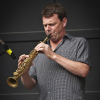 From Matthew Currier Langley
From Matthew Currier Langley I love jazz because it offers freedom of expression while demanding the highest levels of communication, musicianship and spontaneity. It spans the musical spectrum from pure sound exploration to sophisticated harmonic invention and rhythmically it can be anywhere from free and sparse to totally dense and driving. What's not to like!?
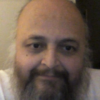 From Henry Martinez
From Henry Martinez I love jazz because it's evolutionary without abandoning its roots (and it's just so damn cool!). I was first exposed to jazz by Bitches Brew era Miles Davis. The best show I ever attended was the RTF quartet at the Berkeley Community Center (this was the early 80's, so I may have the venue wrong). The first jazz record I bought was Miles Davis' Bitches Brew. My advice to new listeners... listen.
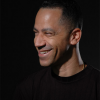 From Frank Moten
From Frank Moten Though born in New York City, I spent my childhood in Englewood, New Jersey surrounded by neighbors like George Benson, Wilson Pickett, Tony Bennett, The Isley Brothers, Sarah Vaughan, Miriam Makeba and Clyde Otis—which probably explains my passion for music and his infatuation with the music industry. Even still, growing up among a group of music legends wasn't the most amazing thing that ever happened to me. Dizzy Gillespie was.
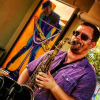 From Michael Moynihan
From Michael Moynihan I love jazz because it evokes the emotions and conditions that make us human. It reflects our realest selves.
I was first exposed to jazz by my father who bought me my first jazz record, Blue Train, and let me listen to his Charlie Parker and Miles Davis CD's.
The best show I ever attended was Kurt Rosenwinkel Quintet at the Jazz Showcase in Chicago with Mark Turner on saxophone, Jochen Ruckert on drums, and Joe Martin on bass. Rosenwinkel's song Ezra, dedicated to his son, moved me to tears.
"Jazz is not where the spirit lies, it is where the heart lies. Let your spirit fly free, and your heart do the talking."
 From Bett Butler
From Bett Butler I was first exposed to jazz when I won a portable AM/FM radio in a contest and discovered the stations at the low end of the dial. Billie Holiday's world-weary voice was a gateway for me into a world of musical storytelling, where I've been fortunate to live ever since.
 From Kathy Green
From Kathy Green I was first exposed to jazz as a middle school band student. A college ensemble passed through and put on a concert for the band students (of which I was one). The level of mastery and musicianship blew me away, intimidated, and inspired me. Try as I might, I was never able to achieve a high enough level of competency to perform at the level I was first and subsequently exposed to. Regardless, I was hooked on jazz and remain so to this day.
 From Michael Gibbs
From Michael Gibbs Years ago now—in Rhodesia—listening to Voice of America with Willis Conover I heard Bunk Johnson play "When The Saints Go Marching In," and Billie Holiday sing "Don't Explain." I knew then there was no other life for me than jazz.
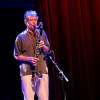 From Dexter Payne
From Dexter Payne Jazz, by definition, continues to re-invent itself. When it is not breaking new ground, it's providing valuable musical commentary on existing traditions. In an age where geographic boundaries are dissolving, jazz becomes an important language. Words sometimes get in the way of understanding—music is the solution. At the same time, I am very interested in the unique expressions of music in differing cultures, something at risk in the modern world. I am currently devoured by traditional Brazilian clarinet and sax, with devious interests in Turkish Rom and Greek clarinet... and Berber Moroccan rhythms, and Fulani flute, and...
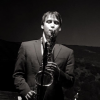 From Adam Carrillo
From Adam Carrillo I love jazz because it is so creative and inspiring. It's a language that few can speak but one that many can enjoy.
The best show I ever attended was a Branford Marsalis concert in San Antonio. He was upset at the hotel venue because his accommodations were horrible. He brought that frustration and "anger" to the set and it was fantastic. The energy was palpable.
My advice to new listeners is to put on a good set of headphones and just listen to a new artist a day—just pay attention to the details in the rhythm section as the soloist tells a story. It is like reading a good book—it takes you places.
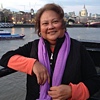 From Stephanie Castillo
From Stephanie Castillo Before I made my jazz film about Thomas Chapin—Night Bird Song, I virtually new nothing about jazz. Yes I listened and liked cool jazz, but that's about it. When I interviewed Thomas Chapin in 1993 and did a short film about him, I asked him, "How do you listen to jazz that sometimes sounds like noise?" He replied: "Any way you can." And so that's what I did when I made Night Bird Song, I listened to Thomas's adventurous, experimental, and far out there jazz any way I could. I just kept listening to this highly stimulating, highly intellectual jazz that he created in his Knitting Factory days in the 1990's until I began to actually find it very interesting and could listen to it and hear in it its complexities and in its creativity. After four years of making and editing the film, after meeting the characters in his life who played with him and understood what he was doing, my brain was getting it and it became quite enjoyable. Jazz is a language, it was said to me, and so I guess I say I've learned enough jazz language to finally begin appreciating it. And to appreciate Thomas and his co-creators. My film is a reflection of my learning from this amazing artist.
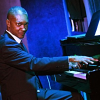 From James Hurt
From James Hurt Jazz is perhaps the most unique platform for self-expression to be employed by everyone from every walk of life in the history of humankind.
 From Gail Ford
From Gail Ford My jazz story. Ah, yes. Supposed it started as a kid, when I listened/watched anything my parents did—they liked swing, smooth jazz, Gershwin, Astair & Rogers films, Hoagy Carmichael, Ray Noble, Glenn Miller, etc, etc. I played by ear, on piano, anything I heard that I liked, which included a lot of jazz standards. When I took up the oboe, a new chapter in the story began, and I now play jazz, Latin, soul, blues, fusion/crossover and just anything that appeals. Chet Baker, Peter Skellern, Ray Noble, Quintet of the Hot Club of France, anything with a jazz/blues/country tinge to it. And, thanks to all the above, and folk like Scott Stroman for heading up the Guildhall School of Music's jazz summer school, I've learned more, played more, and now write my own stuff. I love jazz because it's helped me find who and where I want to be, and my jazz story is—still growing!
 From Denman Maroney
From Denman Maroney I was first exposed to jazz at age eleven when I bought my first LP, with my own money, because I liked the picture on the cover. It was Work! by Thelonious Monk, with Sonny Rollins, on Prestige. I've never gotten over it.
 From Monika Weiss
From Monika Weiss As a little girl I grew up in Warsaw trained as a classical musician. Piano was always a physical place, a site, that I loved most. It was also an instrument I played. Later I grew up to be a visual artist and filmmaker but composing music remains part of my work as an artist.
Jazz was never in the picture in a home where my pianist mother would decide what was music and what was not. Chopin, Mozart, Brahms or Schubert were those whose music was familiar to me from a very early age. Yet in my teens I discovered and fell in love with Keith Jarrett. I think the first recording was his Cologne concert. It was as if a vast space opened up around me, a space of rhythm and repetition, a space of sparse (and at times absent) melody, which I felt was replaced with thickness and reverb. At the same time I recall listening a lot to Scriabin and reading Thomas Mann's Doctor Faustus (which I think I read at least 5 times) that was loosely inspired by the life and work of Schoenberg. And I became obsessed with the idea of music as a kind of redemption or revolt, or both.
Since then I remain most attracted to music that disintegrates as it happens... Music that in a sense, laments, falls apart, that exposes its vulnerability. It was Thomas Mann who said in his dairies in 1943, that music recognizes itself as lament, finally, in the 20th century. Contemporary, experimental and crossing over to new music kind of jazz, in my mind, provides that vast space and thickness and fragility of sound that I fell in love with as a teenager. These days I still listen to Schubert and Scriabin and to Derek Bailey, or to Phill Niblock (my dear mentor). In my own work (when I work with sound in my experimental films) I find inspiration in Steve Reich's music, especially in his Different Trains. I am also indebted to some of the ideas that John Cage left us with, especially his insistence on silence. But piano and contemporary jazz for piano, remain the most exciting to me, such as my recent discovery, composer and pianist Kris Davis, and my long standing appreciation of the work of Cecil Taylor.
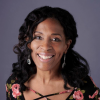 From Mala Waldron
From Mala Waldron I was first exposed to jazz probably before I was even born! Being the daughter of two jazz pianists, most notably my father, Mal Waldron, the music and culture of jazz has always been a part of my life. It has become a natural basis of everything I create, not always consciously, but because it is a very essential part of my being.
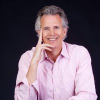 From Jim Phillips
From Jim Phillips I was first exposed to jazz while working overseas in Africa as a Peace Corps Volunteer. I would listen to the "Voice of America" on the radio and they had a nightly jazz program on at 10:00pm. I learned a lot about jazz listening to this program. I also had a friend who listened to real jazz by artists like Charles Mingus, Eric Dolphy and Archie Shepp. On my way home from Africa I landed in New York and had the opportunity to see the George Adams/Don Pullen quartet at the Village Vanguard as well as Kenny Barron and Ron Carter at another club, and was in heaven.
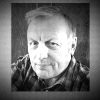 From Michael S. Clark
From Michael S. Clark Long ago, in the twentieth century, jazz provided the soundtrack to our lives -whether people care to admit it or not. Of course other things happened. There was Elvis, The Beatles, Woodstock and Live Aid. We even smiled politely at the myriad rock n roll comebacks that peppered the late 1990's.
There are lots of other musical forms that I love but jazz in all its amazing diversity has been something of an anchor. It began, as it often does, with the singers like Sinatra, Nat King Cole, Ella Fitzgerald and Tony Bennett. Of course, we're talking about the parents' record collection here, but hang on what's this? Django Reinhardt? Now, that looked interesting but where was I going to find out more? There was, and still is, only one place fit for that purpose. The radio.
So, from about the age of twelve or thirteen, I pretty much listened to jazz every week, usually on a Sunday. I even got to know some of the names and the faces and the sounds pretty well, but mostly I just listened.
However, my jazz education really began quite recently when I started writing about it. I'm no jazz historian and I'm certainly not a musician. I prefer to describe what jazz delivers rather than the date and time it was made and what the catalogue numbers are. So, I'm a bit flowery in my descriptions of what I hear.
I think that a new generation of listeners would really love jazz but they need better access to it. I think my function is to tell them how I feel about John Coltrane, Eric Dolphy, Miles Davis, Oscar Peterson and Joe Pass rather than relate where they went, who they were with, and what they did when they got there.
I also want younger people to understand that contemporary players are taking jazz into great new places while preserving every drop of spirit and spirituality in the music.
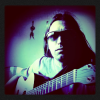 From Frank Barton
From Frank Barton The art of improvisation, the flow of stream of consciousness music, the meditation, the vibration of it—the focus and the balance of cascading notes and chords—the ebb and flow of jazz like the tides—like a splatter painting or a slam dunk—it's dance, sculpture of sound, and sound carved air patterns of silence and rhythm.
Jazz music is real.
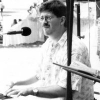 From Lee Tomboulian
From Lee Tomboulian I love jazz.
I was first exposed to jazz by Mrs. Poor, my third-grade music teacher, who played us Coltrane's Om, and A Love Supreme. (She later became Mrs. Banker, so maybe she was onto something! Later I had a jazz aficionado for a HS Band Director, Bill Machold, who also played us A Love Supreme and lent me records.
I met Marty Ehrlich playing in a big band in HS, and ended up playing with all the great players who went through my college town.
The best show I ever attended was perhaps Sonny Rollins in Austin Texas, which I walked to, in the pouring rain, with a pie plate on my head. Don't ask.
The good news is that a lot of young people are listening and connecting with jazz. And why wouldn't they? It's the sound of humanity after all.
 From Mark Corroto
From Mark Corroto I love jazz because besides descending a mountain on a road bicycle at 55 mph or a glass of Vino Nobile di Montepulciano, nothing makes my endorphins rush like an Albert Ayler or Mats Gustafsson solo.
I was first exposed to jazz watching Warner Brother's cartoons.
I met Peter Brotzmann in 1991 at a show in Youngstown, Ohio. He was (to my surprise) such a gentle soul, and inspiring artist.
The best show I ever attended was... hmm... that's a hard one, either the Sun Ra Arkestra 1989, Naked City 1993, or Randy Weston ensemble 1987, maybe Sonny Rollins in New York 1993, or was it The Thing 2003? Maybe Matt Wilson's Quartet last year.
The first jazz record I bought was Weather Report's Mysterious Traveller.
My advice to new listeners...Don't ask me if this particular recording is good jazz, if YOU like it it's good jazz, if YOU don't it isn't good jazz.
Jazz is about exploring, connecting the dots: Miles Davis played with John Coltrane and Charlie Parker (who started bebop)—But also made funky electric music, and Carlos Santana recorded Coltrane's Love Supreme with John McLaughlin, who played with Miles and Miles' drummer Tony Williams, which might be the first fusion. Everyone references Louis Armstrong, who's career paralleled bebop but wasn't bebop, although Dizzy Gillespie, another bebop originator was quite taken and inspired by Satchmo. The threads running between players and styles cross and loop endlessly. There is a lifetime of study (that's a bad word), I mean enjoyment as chasing the dots and connections.
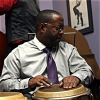 From Joe Harrison
From Joe Harrison I love jazz because its speaks to my soul. It is the music of my people. As a child I was surrounded by African American music. Sometimes it was my mother singing church songs while washing clothes or maybe my dad playing James Brown in the car. Jazz for me was just another form of the Black music that was in and around Philadelphia. I could feel the relationship between the Gospel music from church, the R&B at home and on the radio, the blues music that my neighbors played and jazz. Later, I was exposed to the pulse African drumming. Those African rhythms are the connection and the foundation for of all of these forms of music. For me jazz incorporates all of these. There is a spirit in the music. This is what keeps jazz alive for me.
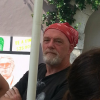 From John Eyles
From John Eyles I love jazz because anything is possible; it has few rules and the best jazz breaks those ones. I prefer free improv because it doesn't really have any rules at all.
I was first exposed to jazz in my teens (in the late sixties).
The first jazz record I bought was Filles de Kilimanjaro by Miles Davis, shortly followed by Extrapolation by John McLaughlin.
My advice to new listeners is to listen as widely as possible and not to make snap judgments—stick with it.
 From Nicole Bookman
From Nicole Bookman I love jazz because it's simple and complex all at once. It's careless and cerebral simultaneously. It requires tremendous skill and musicianship to execute but only requires the audience to have an open mind and open ears.
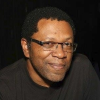 From Nigel Campbell
From Nigel Campbell I love jazz because it capture emotions and stimulates both sides of my brain. I was first exposed to jazz very early from my father's record collection containing the pioneers of jazz from the 1940s and '50s. Chauvinistic pride in all things Caribbean led me to the jazz fusion exercises that were taking place in the there and specifically my island of Trinidad. The first jazz record I bought was by Caribbean jazz pianist Clive Zanda, whose music led me to Monty Alexander and others. I have since become a promoter and have met most Caribbean jazz musicians. A special kind of musician.
The best show I ever attended was Pat Metheny during his The Way Up tour. All that music for the one tune performed perfectly, and "no sheet music" for cues. Musicians and players must have a bar or a goal. In my estimation, Metheny is an apt bar to broach.
 From Matthew Aquiline
From Matthew Aquiline Growing up in these technological times, I had the traditional preconceived notion that jazz was all elevator music with slick production... needless to say, I was terribly wrong. I was first exposed to Coltrane's A Love Supreme at age 13 and was taken aback by the pure potency of the music; it was raw, unforgiving, and unrestrained. Since then, I've been learning and exploring the ins and outs of the jazz world and have made it my goal to expose fellow young people to this massive catalog of unique American music that's waiting to be discovered.
You can read more jazz stories here.
Share your jazz story with the All About Jazz readers. Once logged in, click the blue "Update Page" button on your member page, then scroll down to the "Share your story" box. Enter and save. Thanks for sharing!
Comments
Tags
What is Jazz?
Michael Ricci
Miles Davis
george benson
Tony Bennett
Sarah Vaughan
Dizzy Gillespie
Kurt Rosenwinkel
Billie Holiday
Branford Marsalis
Thomas Chapin
Glenn Miller
Thelonious Monk
Sonny Rollins
Derek Bailey
Kris Davis
Cecil Taylor
Charles Mingus
Eric Dolphy
archie shepp
Kenny Barron
Ron Carter
Ella Fitzgerald
Django Reinhardt
oscar peterson
Joe Pass
Mats Gustafsson
Sun Ra
Randy Weston
Matt Wilson
Charlie Parker
john mclaughlin
Tony Williams
Monty Alexander
pat metheny
For the Love of Jazz
 All About Jazz has been a pillar of jazz since 1995, championing it as an art form and, more importantly, supporting the musicians who create it. Our enduring commitment has made "AAJ" one of the most culturally important websites of its kind, read by hundreds of thousands of fans, musicians and industry figures every month.
All About Jazz has been a pillar of jazz since 1995, championing it as an art form and, more importantly, supporting the musicians who create it. Our enduring commitment has made "AAJ" one of the most culturally important websites of its kind, read by hundreds of thousands of fans, musicians and industry figures every month.






















